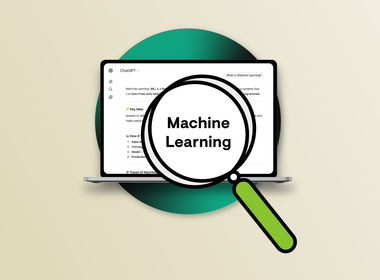Machine Learning: What is It and Why is It Important?
In the age of AI, machine learning (ML) stands out as a pivotal innovation. But what exactly is machine learning, and why is it so crucial? Let’s demystify machine learning, explore the primary types of machine learning, and clarify its relationship with AI.
What is machine learning?
Machine learning, often referred to as ML, is a subset of artificial intelligence that focuses on building systems capable of learning from data. Unlike traditional programming, where explicit instructions are given, machine learning algorithms identify patterns and make decisions with minimal human involvement.
This ability to learn and adapt makes machine learning a powerful tool in various fields, from healthcare to finance.
Why is machine learning important?
Machine learning is transforming industries by enabling more efficient processes and innovative solutions. It allows for predictions and insights that were previously unattainable, driving advancements in areas like natural language processing, computer vision, and fraud detection.
By automating complex tasks, machine learning not only saves time but also enhances accuracy and decision-making.
Is there a difference between AI and machine learning?
While often used interchangeably, AI and ML are distinct concepts.
- Artificial intelligence is a broader field that encompasses any technique enabling computers to mimic human intelligence.
- Machine learning, on the other hand, is a specific approach within AI that uses algorithms to parse data, learn from it, and make informed decisions.
Essentially, all machine learning is AI, but not all AI involves machine learning.
I think it’s important to distinguish between artificial intelligence and artificial general intelligence, because I think that when people think of AI, what they're really thinking about is AGI, where AGI is defined as something that is human-level intelligence.
When we say AI, we're actually talking about more advanced machine learning. Usually, we're talking about deep learning. We're talking about bigger models, something that is generally intelligent, not just good at doing one little thing.
How does machine learning work?
Machine learning operates through a series of steps that involve data collection, model training, and evaluation. Here's a simplified breakdown:
- Data collection: Gather relevant data that the machine learning model will learn from. This data can be labeled (supervised learning) or unlabeled (unsupervised learning).
- Data preparation: Clean and preprocess the data to ensure quality and consistency.
- Model selection: Choose an appropriate algorithm or model based on the task at hand.
- Training: Use the data to train the model, allowing it to learn patterns and relationships.
- Evaluation: Test the model's performance using a separate dataset to ensure accuracy.
- Deployment: Implement the model in a real-world setting where it can make predictions or automate tasks.
What are the four types of machine learning?
Machine learning can be categorized into four main types, each with unique characteristics and applications:
- Supervised learning: Involves training a model on labeled data, where the desired output is known. It's commonly used for tasks like classification and regression.
- Unsupervised learning: Deals with unlabeled data, allowing the model to identify patterns and groupings independently. Clustering and association are typical applications.
- Semi-supervised learning: Combines elements of both supervised and unsupervised learning, using a small amount of labeled data alongside a larger set of unlabeled data.
- Reinforcement learning: Involves training models to make sequences of decisions by rewarding desired behaviors. It's widely used in robotics and game development.
Real-world use cases for machine learning
Machine learning's versatility is evident in its diverse applications across industries:
- Healthcare: Enhances diagnostic accuracy and personalizes treatment plans through predictive analytics.
- Finance: Improves fraud detection and risk management by analyzing transaction patterns.
- Marketing: Predicts customer behavior like churn and conversion, and automates audience segmentation for highly targeted campaigns.
- Retail: Optimizes inventory management and personalizes customer experiences with recommendation systems.
- Transportation: Powers self-driving cars and optimizes logistics through route planning and traffic prediction.
What is the role of machine learning in AI search?
Machine learning plays a crucial role in AI search by improving the relevance and accuracy of search results.
Through techniques like natural language processing (NLP) and deep learning, machine learning models can understand user intent and deliver more personalized and contextually appropriate results. This capability is essential for AI-powered search engines and virtual assistants.
Machine learning in review
Machine learning is a key aspect of AI technology that continues to reshape industries and drive innovation. By understanding it, we can better appreciate its impact and potential.
Whether you're a digital marketer, web developer, or business leader, embracing machine learning can unlock new opportunities, improve efficiency, and enhance your strategic initiatives.

![Orpheus Mall, Principal Software Engineer, [object Object]](https://cdn.sanity.io/images/tkl0o0xu/production/8c7a026f590f15c14845e3f08933fa143363af72-300x300.jpg?fit=min&w=100&h=100&dpr=1&q=95)






